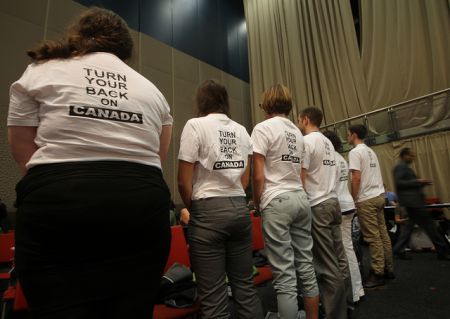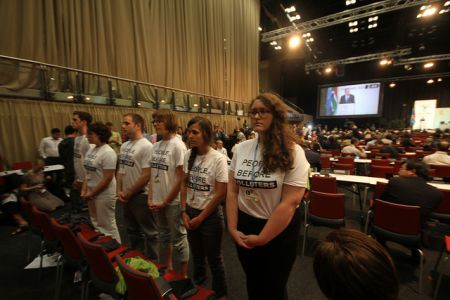The high-level negotiations phase at the UN's climate change conference in Durban, South Africa, began today. Environment ministers and high ranking politicians from around the world gave their opening remarks at a plenary session, including Canada's Environment Minister Peter Kent.
While most Canadians were likely asleep or just waking up at the time of the the minister's address, some Canadians were listening and didn't like what they heard.
As Kent was delivering his speech, six members of the the Canadian Youth Delegation (not affiliated with the official government delegation) stood up in silent protest and turned their backs on the plenary session. All six wore t-shirts reading, “Turn your back on Canada.”
The statement was a call for other countries to move forward with negotiations for a new, binding accord whether Canada agreed to join or not.
“By stalling international progress, the actions of this government put the future of our country and our generation in danger; we won't take that sitting down,” said James Hutt. “As long as Canada is at the negotiation table promoting industry over human rights, we will never see the climate agreement the world needs. It's time to leave Canada behind.”
When reached for comment about today's action, Darcy Cornu, a media relations officer travelling with Kent in South Africa, responded with puzzlement. “Which action was that?” he asked.
“We must have missed that,” responded Cornu after being explained the action, which by that time had already been widely reported in the Canadian media and over twitter. The protest had also drawn considerable attention and applause from other delegates in the room.
Karen Rooney, a spokesperson for the CYD, said she wasn't surprised by Cornu's response. It simply reflected the minister's continued stance of ignoring the criticisms coming from young Canadians and communities most impacted by climate change and environmental pollution, including Indigenous communities across the country, she said.
In his address to the plenary, Kent re-iterated that Canada will not agree to any extension of the Kyoto Protocol, which Canada has ratified and which committed the country to reducing carbon dioxide emissions to six per cent below 1990 levels by 2012. Emissions in 2009 were 17 per cent above 1990 levels, according to a National Inventory Report from Environment Canada.
“[The Kyoto Protocol] covers fewer than 30 per cent of global emissions,” said Kent in his statement to the plenary. “It is an approach that does not lead to more comprehensive engagement of key parties who need to be actively part of a global agreement. Nor does it provide for individual countries to take action that reflects national circumstances.
“Kyoto, for Canada, is in the past.”
Kent's statement comes following a surprise announcement by China earlier in the week that it would be open to binding reduction targets in a second phase of Kyoto. China is one of the countries Canada has singled out as needing to agree to a binding agreement to make it effective. When asked if China's decision would in anyway influence Canada's stance on an extension of Kyoto, the minister responded with a terse, “No.”
Other governments, including Brazil and the entire African delegation, have criticized Canada for its closed stance on Kyoto. “We’re very frustrated, we’re sad and we’re bitter and it’s a very unfortunate situation,” Seyni Nafo, a senior negotiator for the African delegation, told the Globe and Mail.
The Canadian Youth Delegation–composed of some 30 young people from across Canada–have been actively criticizing Canada's stance since the conference began on Nov. 28.
On Monday, Dec. 5, when the minister gave his first press conference from Durban, two members arrived outside the hotel room where Kent was to meet with members of the media. They were dressed in the “tar sands suits”–emblazoned with the logos of companies involved in exploiting the northern Alberta oil sands–that they launched the previous week. On Tuesday, they were at the COP17 exposition pavilion, handing out “samples” of unrefined bitumen to delegates and other passerby.
Following today's action, the six members of CYD who participated were escorted out by security and stripped of their accreditation, meaning that they won't be able to be on COP17 premises for the remainder of the conference. Despite the repercussions, Rooney said CYD members will continue to take action. “It has become abundantly clear that our voices are not being heard [by Minister Kent] and that action is the only thing to turn to now,” she said.





